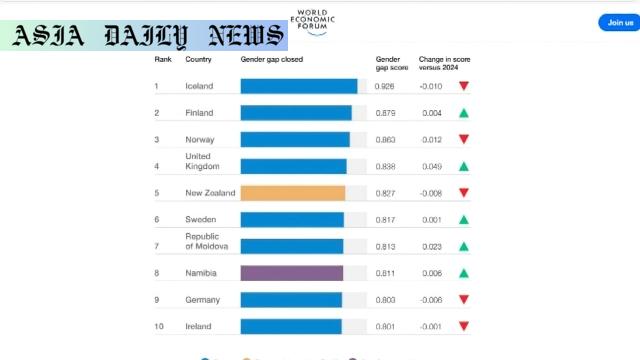Gender Equality: Japan ranks 118th globally in the WEF’s report, facing challenges in political participation despite advances in healthcare.
- Japan ranks 118th out of 148 countries in global gender equality.
- The Global Gender Gap Report highlights political participation challenges.
- Iceland retains its position as the most gender-equal nation globally.
- Global gender equality might take 123 years to achieve at the current pace.

An Overview of Japan’s Position in Gender Equality
Japan’s persistent struggle in achieving gender equality remains a crucial spotlight in the Global Gender Gap Report released by the World Economic Forum. Ranked 118th out of 148 countries for consecutive years, the nation reflects a disparity deeply rooted in societal and political frameworks. While Japan fares commendably in terms of educational attainment and healthcare parity, its political landscape paints a starkly different picture. Women’s representation in ministerial and legislative roles continues to shrink, highlighting the challenges in achieving meaningful participation in governance.
Breaking Down the Gender Gap in Key Areas
The report systematically evaluates gender equality across four major domains: economic participation and opportunity, healthcare and educational attainment, political empowerment, and survival indicators. Japan demonstrates near parity in education and healthcare, marking these as traditionally strong areas. However, progress within the economic domain is nascent, showing moderately improved participation rates for women in the workforce. In stark contrast, the political domain sees a regression, particularly as fewer women occupy leadership roles. This indicates systemic barriers and cultural narratives that impede gender-balanced representation in governance and decision-making.
Contrasts with Global Leaders in Gender Equality
The report further amplifies comparisons by highlighting global leaders such as Iceland, Finland, and Norway, which have maintained progressive strides toward achieving gender equality. Iceland, serving as a global benchmark, has retained its top position for sixteen consecutive years by fostering inclusive policies that address pay parity, leadership representation, and societal attitudes toward gender dynamics. This contrasts strongly with Japan’s statistics, where cultural expectations and workplace norms often prioritize traditional family roles over professional pursuits for women.
The Global Outlook: A Timeline to Gender Equality
On a global scale, the estimated timeline to attain complete gender parity stands at a concerning 123 years, reflecting the slow pace of progress across diverse regions. Japan’s rank highlights broader systemic challenges within Asia, where social hierarchies and ingrained cultural practices continue to shape opportunities for women. Despite notable advancements in nations such as the UK, which ranked fourth, and New Zealand, positioned fifth overall, the path to equitable representation remains treacherous.
Conclusion: Bridging the Gap for a Balanced Future
Japan’s persistence at the 118th rank serves as a call for action, urging policymakers, corporations, and citizens to restructure societal norms and dismantle institutional barriers. Embracing gender-inclusive legislation, encouraging representation in leadership roles, and unlocking economic opportunities for women will remain pivotal. As the world moves closer to bridging the gender parity gap, Japan’s contribution will require substantial and systemic changes to redefine equity in the modern era. The global discourse on gender equality reflects not merely statistics but the collective effort to empower every citizen regardless of gender.



Commentary
The Importance of Equal Representation in Politics
One of the most striking aspects of the Global Gender Gap Report is how political representation skews Japan’s overall ranking. With declining numbers of women in ministerial positions, the country’s progress in empowering half its population through governance appears stalled. The lack of female voices in political decision-making not only limits policy diversity but also perpetuates a male-centric narrative in national and international discourse. Addressing these challenges requires efforts both top-down, through gender quotas and inclusive policies, and grassroots, tackling societal and cultural barriers.
Navigating the Intricacies of Cultural Expectations
Japan’s deep-rooted cultural norms present unique obstacles to achieving parity. Traditional roles often dictate that women prioritize family over career, a notion further reinforced by constrained maternity policies and rigid workplace environments. The “glass ceiling” phenomenon continues to hinder women’s rise to leadership roles, perpetuating economic and social disparity. To overcome this, societal reconditioning and normalization of shared responsibilities are essential. A cultural shift in this respect can inspire the nation’s younger generations while enabling better alignment with global gender inclusivity standards.
The Broader Implications of Gender Equality
The social and economic benefits of gender equality are profound. Studies repeatedly show that greater diversity fosters better innovation, decision-making, and economic outcomes for nations. Japan, as a global powerhouse, stands to gain immensely by unlocking the potential of its female talent pool. Countries leading in gender parity have demonstrated increased GDP growth, boosted domestic consumption, and enhanced work-life balance programs for their citizens. Japan’s economic recovery, fueled by full-scale gender equality, could redefine its standing on the world stage, both in perception and power.